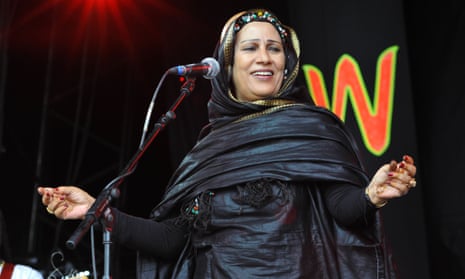Mariem Hassan, who has died of bone cancer aged 57, in a desert refugee camp for the Sahrawi people in south-west Algeria, was one of north Africa’s great singers. She used her powerful voice to publicise the plight of those who were forced to flee from their homeland when Morocco took control of Western Sahara in 1975. She spent much of her life in the camps, starting her musical career in a group that provided support for the Polisario fighters in the war against Morocco, and developed a style that could switch from laments to upbeat desert blues. It was an approach that made her a hero for the Sahrawi people, and also brought her international acclaim.
Daughter of Mohamed and Erguia, she was born in what was then the colony of Spanish Sahara, on the west coast of Africa, in a dry riverbed outside Smara, where her father was a nomad who herded goats and camels. Her date of birth and the spelling of her name were recorded in several different ways on official documents. Mariem was one of 10 children, three of whom would be killed in the fighting with Morocco, and at the age of 13 was forced by her parents to marry an older man against her wishes. She managed to escape during the wedding ceremony, just as she had been led to the entrance to her fiance’s tent, and was hidden by her brothers until her parents returned the dowry. The wedding was cancelled.
She grew up listening to music and poetry, and first starting singing, and playing the traditional tebel drum, when she joined her mother and other women in Thursday night religious meetings, on the eve of the Islamic holy day. As a teenager she also became involved in politics, and in August 1975 she was singing at a clandestine meeting of the Polisario, who were then fighting against Spanish colonisation, when it was broken up by the Spanish police. She escaped through a window.
Her life changed dramatically that October when Spain withdrew from Spanish Sahara and Morocco moved in, in the Green March, to claim the territory. Mariem and her family were among those who fled across the border to Algeria, settling in refugee camps that still exist as a reminder of Africa’s longest-running territorial dispute. While the men went off to fight the Moroccans, the women stayed behind to look after the camps and care for the wounded. Mariem became a nurse in 1977, but after a year took on a second role, helping the struggle as a singer.
She joined the group El Wali, which had been formed in honour of the Polisario’s founder Wali Mustapha Sayed, and became lead singer. With El Wali she toured the refugee camps, encouraging the fighters, and travelled to Europe to spread the Polisario’s message. She sang in Hassania, the Sahrawi language, and became most celebrated for songs praising the Polisario, which were played on Sahrawi radio.
The war with Morocco ended in 1991, since when there has been little progress in resolving the issue of what the Sahrawis call “occupied Western Sahara”, but Hassan continued her musical campaign. In 1998 she joined the group Leyoad, with whom she successfully toured Europe, and released the album Mariem Hassan con Leyoad. In 2004 she contributed to the album Medej.
In 2005 she recorded her first solo album, Deseos (Wishes), but her increasing success came at a time when she had been diagnosed with breast cancer and had moved to Spain for an operation and chemotherapy treatment. One of the finest songs on her album was the desert blues La Tumchu Anni, which was seen as a tribute to those killed in the war, and also a plea for the Sahrawi people to support her through her illness.
She continued to work and in 2007 took part in the filming of the documentary Mariem Hassan: La Voz Del Sahara, made by her Spanish producer and manager Manuel Domínguez, who described her as “one of the most charismatic and respected figures on the world music scene”.
Her international reputation flourished, and between 2008 and 2010 she took part in a series of Womad festivals around the world, including appearances at Charlton Park in the UK in 2009, with visits to Australia and New Zealand the following year. In 2010 she also released the album Shouka, which made use of Sahrawi instruments and rhythms, with songs that examined the history of Western Sahara and the refugee situation, and in 2012 released her third solo album, El Aaiun Egdat, a bestseller in the European world music charts. It included Gdeim Izik, an angry political song that dealt with the Moroccan attack on a protest camp in 2010, and was a reminder of her still-thrilling and powerful voice. This year she released Baila Sahara Baila, an album of dance song for Sahrawis.
She gave her last concert in the bleak desert camps at the FiSahara festival last year, when she thanked the refugees for allowing her to be their voice. The cancer had now spread to her bones, and as her health deteriorated, she returned to the camps for the last time in early August this year, and remained there until her death.
Mariem is survived by her mother; by her husband, Bachir Mohamed, and their children, Salem and Agalia; and by three children, Ahmed, Nina and Fatimetu, from her first marriage, to Hamadi Breika, which ended in divorce.

Comments (…)
Sign in or create your Guardian account to join the discussion